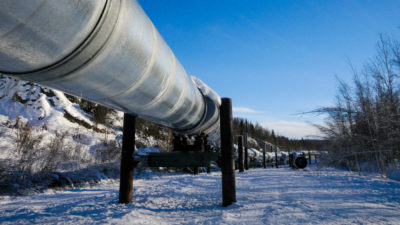It hasn’t been a great year for Canada’s oil producers, with Canadian Oil Sands Ltd. (TSX:COS) being among the hardest hit. The former dividend darling has fallen by almost $17 per share over the last year, currently trading at a hair above $6 per share. The price of crude has been the main culprit, falling some 65% during that time. It goes without saying that it’s hard to make money when the price of your product declines by 65% and your costs stay largely the same.
Lately, many of Canada’s medium and smaller oil producers have been the target of bearish calls by analysts, convinced that the global macroeconomic picture is telling us cheap oil is here to stay. According to these pundits, most Canadian oil producers simply don’t have the balance sheet strength to survive a prolonged decline in the price of crude.
Canadian Oil Sands is the latest company put under such a microscope. According to bond rater Moody’s, the immediate future is going to look pretty grim for Canadian Oil Sands. Moody’s recently cut its rating on the company’s bonds, telling investors “the negative outlook reflects [Moody’s] expectation that debt-to-EBITDA will remain above 5x through 2016 (assuming US$52/barrel WTI pricing) and that [Canadian Oil Sands] will continue to debt fund negative free cash flow in the current price environment.”
Translated into simpler language, Moody’s is convinced low oil is going to stick around for a little while, and Canadian Oil Sands will be forced to fund inevitable operating loses with more debt. That’s not good news, especially if crude stays low for years.
That brings us to the question that has to be on the minds of Canadian Oil Sands shareholders. If this pricing environment continues, just how long can the company survive? Let’s delve into the numbers a little further and see if we can figure it out.
The good news
I’ll get right to it. The good news for shareholders is the company is nowhere near becoming bankrupt. Yes, the company does owe more than $2.4 billion in net debt, which is slowly creeping up not just because it’s being forced to finance losses, but because the Canadian dollar is weakening against the U.S. dollar denominated debt. The amount owed is staying steady in U.S. dollars; it just looks worse when translated back to Canadian bucks.
The strength in the U.S. dollar isn’t all bad though. Since the company’s main expenses are in Canadian dollars, costs per barrel in U.S. dollars have declined significantly. Breakeven costs have gone down to approximately US$50 per barrel, which means we’re looking at only a $12 per barrel improvement in the price of crude before the picture starts getting much better for Canadian Oil Sands.
Besides, the debt situation isn’t so dire. The company doesn’t have any major debt renewals coming up until 2019; plus it has credit facilities for an additional $1.5 billion that have been extended until the same year. There’s also the possibility of one of its partners in the Syncrude project loaning them money, buying part of its ownership stake, or buying the company outright.
And when you look closer at the losses through the first half of the year, they haven’t been so bad. If you look at the company’s free cash flow and the amount it paid in dividends, it looks like the company burned through about $125 million in the first six months of 2015. For a company with the ability to easily borrow more than 10 times that amount, this isn’t such a big deal.
I’m the first to admit the oil market doesn’t look good—at least in the short term. But over the long term, there will still be plenty of demand for oil. The price of crude will be much higher; it’s only a matter of time. As long as investors choose good producers with solid balance sheets—like Canadian Oil Sands—they should be fine waiting out the storm, and even be poised for some sweet capital gains when this current crisis is just a memory.







